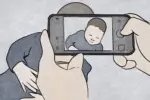For someone who has never been in a relationship, Conan Gray channels heartbreak and heartache like a young Gen Z Taylor Swift. Even she has publicly praised his music. Friends with this generation’s rising superstar, Olivia Rodrigo, he brings a similar caliber of quality angst to the table. Working with Rodrigo’s producer Daniel Nigro, Gray leaves nothing off the table in his new album, “Superache.” Since his first album, “Kid Krow” (2020), he’s grown as an artist, developing a smoother melancholy and weaving evocative descriptions through his lyrics. Yet he keeps the failed relationships of standout songs like “Maniac” and “Heather,” evolving their themes into something more mature.
Released on June 24, “Superache” delves deeper into raw emotion with a sweeping sense of anguish. Gray’s grief about love lost or never found at all echoes in almost every song. It surrounds, drifting ethereally, and doesn’t let go. While a few of his songs deal with friends and family, most are about rarely successful romance. He traverses want, fear of commitment, toxic relationships and moving on with an astonishingly deft, albeit imperfect, touch for a 23-year-old.
Want
With “Yours” and “Footnote,” Conan Gray dives deep into yearning, the desperate want of unrequited love. He explores the lengths one would go through just for a moment of attention from the one they love, even if they’re treated terribly the rest of the time.
From the first melancholy piano bars, “Yours” is a heart-wrenching journey, with Gray desperately seeking the love of someone who won’t love him back. He promises this person “the stars and the sun” but he still faces rejection. He sings in a desperate duality, his voice holding the end of each line for several bars, “I want more / I want more / But I’m not yours.” The lines are short, simple and heartfelt. Eventually, though, he faces reality and asks the subject of his song “tell me that it’s time for me to go / ‘cause you know I can’t do it on my own.” It’s too late, however, to emerge unscathed. His want has a high cost: “Can’t believe I chose you over all my best friends / What the f— did I do in the end? / Just to not be yours.”
The 10th track on the album, “Footnote,” feels like the spiritual predecessor to “Yours.” It’s about loving someone who loves someone else, someone whose feelings won’t change. For his unrequited love, Gray is willing to do whatever this person wants for little in return, to “just take a footnote in your life / And you could take my body / Every linе I would write for you / But a footnote will do.” Compared to some of the more dramatic tracks, the tune is understated and easy to forget about. It’s just quietly going through the motions, a perfectly fine song but no standout. Yet maybe that only helps it to live up to its title: On “Superache,” a grand collection making every heartbreak larger-than-life, it’s just a footnote, and that’s okay.
Fear of Commitment
Neighboring tracks in “Superache,” “People Watching” and “Disaster” tell different stories of fearing commitment but still complement each other well. One is about being hurt in the past, while the other conveys a fear of losing a person forever if something goes wrong.
“People Watching” opens with a description of another couple’s relationship. The slightly voyeuristic intro (as Gray later sings, “I’m only looking just to live through you vicariously”) picks details that seem inconsequential on their own. Together, their clever combination paints a picture of a loving couple, the disgustingly adorable kind that would always seem to cling to each other in public. As Gray telegraphs through his lyrics, he’s scared of commitment because he has been burned before. In the past, he “had a dream about a house behind a picket fence,” a symbolic description of the late 20th century picturesque American family, with its two kids, a dog, and a station wagon. But his relationship surrounding that dream fell through, revealed in the next line, “Next one I choose to trust, I hope I use some common sense.” Since then, his actions have only led him to “end up alone.” His hopeful want for another relationship ends on a bittersweet note: “Someday, I’ll be falling without caution / But for now, I’m only people watching.”
Notably, this second track on “Superache” makes clever use of its audio sample of a crowd, the kind of coffee-shop background noise that blurs together. Yet it stands out in its unusual use here as a transition between verses. Gray’s voice carries over the background, but the rushing sound of the sample creates a more public atmosphere and the feeling of standing outside looking in.
As fast-paced as Gray’s overthinking, the next track, “Disaster,” showcases his fear of taking the step from a friendship to maybe something more. Despite encouragement from another friend, he’s scared of “losin’ it all” if the person he’s in love with doesn’t reciprocate. Instead, he comes up with all the ways “This could be a disaster,” running through the what-ifs, worrying about how “There’s so many factors.” In the end, he’s paralyzed, making no decision at all.
An entertaining complement to the song, the music video for “Disaster” fits an imaginary journey of bad dates into the frame of Conan Gray being asked out by the waiter while enjoying breakfast with a friend. While Gray stares off into space at the table, reliving the hilarious horror show of red-flag-filled dates, his friend says the singer has a problem with commitment, leading the now-concerned guy asking him out to walk away. It’s a fitting juxtaposition, showing the danger of losing what’s right in front of you because you’re lost in the past. Fear of commitment can be a self-fulfilling prophecy. But the actual dates present an interesting scenario: Each date is a disaster in its own right, from a creepy superfan to a locked car alone in a parking lot filled with vape smoke. Yet Gray himself also ruins these dates, tearing down pictures and smashing someone’s guitar.
Toxic Relationships
Not every relationship is meant to be, and those that aren’t can be painful to stay in. With “Jigsaw” and “Movies,” Gray highlights the imperfections of two such relationships while taking a different approach for each.
With its grating guitar, “Jigsaw” showcases the pain that comes from changing oneself for someone else. Desperate for their partner’s love, the song’s subject becomes unrecognizable to themselves yet still doesn’t receive the affection they desire. The entire song is gloriously askew, keeping the listener purposefully off-balance with Gray’s bitterness. With a broken pain, Gray sings, “I’ve changed every part of me / Until the puzzle pieces aren’t me at all.” Rather than a song like “Yours,” which shows the middle of such a want, “Jigsaw” delves into the aftermath with an awareness like “If I made you like me, would I even like myself? / Pointing out my flaws doesn’t help.”
By contrast, “Movies” opens “Superache” gently with a tale of what seems on the surface to be a picture-perfect romance. Yet far from fantasy, the relationship is seemingly “all just for show / ‘cause Monday through Friday, we both barely spoke” and Gray’s partner torturously still loves and talks to their ex all the time instead. With such a terrible reality, Gray retreats into fiction, imagining an idealized version of the relationship “in my head.” In the end, however, he admits that “we lost all the love that we had / And I can’t pretend it’ll ever come back.”
Moving On
In a sharp contrast to his desire for a relationship in earlier tracks of “Superache,” Conan Gray deals with the aftermath of breakups in the raw “Memories,” the sweeping “Astronomy,” and appropriately titled closing track, “The Exit.”
Progressing through highs and lows, “Memories” crafts an emotional journey from start to finish. A portrait of deceit, Gray claims at the beginning of the song that he’s moving on. His somber yet understated voice matches the lyrics perfectly. By the end of the song, however, he’s belting his broken heart out, revealing that he’s “barely just surviving.” While he’s unable to turn his ex away, he also struggles with having them back in his life in any capacity, saying that he’s “traumatized.” Even the scent of their cologne “makes me feel like dying,” he admits, a far cry from his intro where he placidly says “now I kinda smile” at looking at their pictures. Moving on is difficult, something well represented by the way he internally begs his ex, as though beholden to them, “Please don’t ruin this for me / Please don’t make it harder than it already is / I’m trying to get over this.”
Wistful and bittersweet, “Astronomy” illustrates a relationship growing apart through quite literally stellar imagery. Gray grounds the beginning of the song with the description of a “drive through the woods, rich neighborhoods to watch.” From there, the song expands into this relationship’s end. Even as the pair fights to keep the relationship going, Gray knows “You can’t force the stars to align when they’ve already died / Oh we’ve died,” as his most visceral lyric goes. For all its sadness, “Astronomy” is still peacefully accepting of the relationship’s demise. The closing lines “As much as it seems like you own my heart / It’s astronomy, we’re two worlds apart” fade out without malice, with perhaps a moment of fondness.
Fittingly titled to end the album, “The Exit” focuses on a particular experience — being in love with your ex — and adds to it the gut-punch of that ex entering and then exiting another relationship. The line “You already found someone else to miss” encapsulates the loss he feels. While Gray describes the pain of their breakup as “matching wounds,” he makes clear that they healed and moved on very differently, with his wounds “still black and bruised” while “yours is perfectly fine now.” Matching that pain, Gray feels the shock of realizing that the other person had secretly started dating someone else while he still wanted his old relationship back. Rather than moving on, he thought they both viewed their relationship as “something that never died” and “So God, it hurt when I found out” that their ex had moved on.
While the song can’t match the best in “Superache,” it stands out with how it mimics the feeling of the world stopping. The background music goes silent each time Gray says “the exit,” then comes back louder a second later. When he experiences this surprise, he can’t hear anything else, and then everything crashes back in even more intense than before. He does this periodically throughout the song but it doesn’t get old. I just find it’s a missed opportunity for Gray not to end the song and the album altogether with the words “the exit.”
Family
The different takes on romance may each bring their own perspective, but Gray absolutely shines in the way he describes family. His background has its own struggles, which he emotionally unleashes in “Family Line” and, to a lesser extent, “Summer Child.”
Far beyond any other in “Superache,” the personal heartbreak of “Family Line” may very well be designed to wreck the listener. Its muted beginning, with Gray’s paralyzed, powerless voice projected over weak guitar chords, is enough to bring tears to the eyes as he crafts a tale of childhood abuse and its lasting impact. He can’t escape their lasting impact despite his many attempts, recognizing with a haunting echo that “I truly am my parent’s child.”
As he compares himself to his family in the chorus, his voice remains tortured and the chilling harmony brings tears to the eyes, even as the music grows louder. Gray only reaches the most harrowing yet triumphant part of the album when he sings, “All of my past, I tried to erase it / But now I see, would I even change it? / Might share a face and share a last name but / We are not the same.” It’s only with the realization that this doesn’t define him that he frees himself to reach his strongest point.
Though “Summer Child” has little hope of matching “Family Line,” its gentle touch guides the listener down from the previous song into another, similar sadness. It’s one that they can more easily process, bringing little new to the table before transitioning to the rest of the album. But unlike the last song, there’s no triumph here: It’s just Gray acting as a witness to a child with a tough home life and mental health issues. Combining seemingly mundane observations with more sinister moments and sometimes off-key guitar, each line betrays an underlying wrongness. Through each verse, Gray both soothes the child with picturesque lyrics and reveals the tough realities that face the “lying summer child,” who quickly seems quite fragile beneath a delicate, yet strong shell.
Friendship
Early in “Superache,” “Best Friend” marks a playful distraction from the other songs on the album. (It’s also about as foul-mouthed as GAYLE’s “abcdefu.”) Its laid-back tune relies on Gray’s affectionate, remarkably chill delivery to make the song celebratory. In a sweet detour, the song takes time to comment on a “promise that I’m gonna marry you / If we’re both still single by, like, thirty-two.” That is perhaps the closest it gets to the romantic love of most of the tracks. But most importantly, it also showcases the reciprocity of a good friendship. While Gray asks “Who else is gonna grocery shop with me at 2 A.M.?” he also questions “Who else will take that picture for you just to get revenge?” One’s best friend, of course. The commentary is a two-way, lovingly twisted street that describes the bizarre favors best friends sometimes do for each other. As Gray notes, “You’re just as psycho as me, just as sick inside the head.” Based on the song’s excited outro, an audio clip simulating Gray’s eager, supportive side of a phone call, it doesn’t sound like a bad life being Gray’s best friend.
From its core in “Family Line” and other heartbreaking tracks like “Memories,” “Jigsaw,” and “Yours,” to lighter tracks like “Footnote,” “Movies,” and “Best Friend,” Conan Gray’s new album “Superache” traverses a full range of youthful emotion. There’s something for everyone to cry to, and the listener might even kind of smile. While it isn’t quite a movie, it’s clear throughout the album that Gray knows how to create a spectacle, down to the heart made of roses on the album cover. Hopefully, his next album will continue on from the trajectory between “Kid Krow” and “Superache,” showcasing even more personal and thematic growth.

















